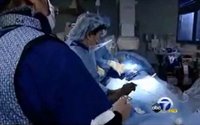Can gastric bypass cure diabetes?

San Francisco, CA
A new study is trying to learn whether a surgery meant to cure obesity, could also cure the symptoms of diabetes, even if the patient isn't overweight. It's a strategy that's not without controversy.
Pat Prescott is fighting to control her type 2 diabetes. She carries her blood glucose meter, a cooler for her insulin and gets regular exercise through ballroom dancing.
Still she says her symptoms have been getting worse.
"It just doesn't work anymore," said Prescott.
So when she learned that a surgery used to treat obesity has the side effect of improving diabetes, she approached her doctors, but was told she wasn't overweight enough to qualify.
Now, she's hoping to join a new clinical study, headed by surgeon Francesco Rubino. He is testing whether that same surgery, similar to gastric bypass, can improve diabetes in people who aren't obese.
"We're shifting towards a new concept, which is using surgery to intentionally treat diabetes," said Dr. Francesco Rubino from Weill-Cornell Medical School.
As he documented in the Journal Diabetes Care, when obese patients have surgery that bypasses part of their small intestine, their symptoms often disappear within days, long before they begin to lose weight.
"With some operations like gastric bypass or similar procedures, the remission of diabetes symptoms is very quick after surgery, which even precedes the weight loss," said Dr. Rubino.
In fact, researchers have known about those effects for several years. But offering gastric bypass to non-obese diabetics is controversial.
"I think it has no place outside of obesity surgery," said UCSF professor of endocrinology Dr. Robert Lustig.
Dr. Lustig says diabetes can be caused by combination of factors, including the health of beta cells, the agents in the pancreas that produce insulin.
"Diabetes is a complex disease. If you have a problem with your beta cells, then doing a bariatric surgery isn't going to rescue you," said Dr. Lustig.
Still, patients like Pat Prescott may have a part in testing the theory. Recruitment for the study begins this fall.
"I want to live long enough to enjoy my grandchildren. I want to keep dancing, I like to dance," said Prescott.
It's significant to note that the type of gastric bypass being tested in the study is performed on the small intestine, which has a complex role in how the body processes food.
Labels: gastric bypass diabetes, gastric bypass research, patient stories

0 Comments:
Post a Comment
<< Home